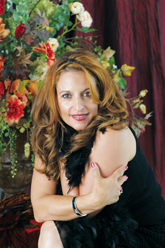home | metro santa cruz index | music & nightlife | band review

Do Re Mi Fado: Bay Area chanteuse Ramana Vieira brings her singular take on Portuguese fado to Cayuga Vault this Friday.
Fabulous Fadista
Ramana Vieira brings her new take on an old art form to Kuumbwa.
By Andrew Gilbert
In Lisbon, a dazzling new generation has reclaimed fado, the Portuguese musical style long associated with the conservative political regime that dominated the country for most of the 20th century. With its unabashed emotional intensity and preoccupation with heartbreak, betrayal and separation, fado is torment rendered exquisite by charismatic, full-throated singers like Mísia, Dulce Pontes, Mariza and Cristina Branco.
In the United States, no one is doing more to breathe new life into fado than Ramana Vieira, a sultry, dramatic singer who performs on Friday at the Cayuga Vault in a concert presented by Fiddling Cricket. She's joined by an innovative ensemble featuring former Cirque du Soleil cellist Marcie Brown, Jeffrey Luiz on classical guitar, bass guitarist Alberto Ramirez and percussionist Stephen La Porta.
Born in San Leandro to parents from the Portuguese island of Madeira, Vieira has embraced the music of her ancestors while seeking to render it relevant to American audiences. Unwilling to merely draw from the old repertoire of fado standards, she has created a new body of songs by setting the Portuguese poetry of José Raposo to music. She also sings a few tunes in English, a daring move in a tradition-bound art form.
"The purists of the fado world kind of cringe that I'm trying to sell fado," Vieira says from her home in San Leandro. "What is fado? We can make it whatever we want. Fado is really the blues of Europe. In the American blues, there are upbeat tunes, ballads and Kansas City stomps. It's very similar with fado. We can do an up-tempo piece or a very melancholy fado, full of yearning for lost love."
In translating fado into a North American context, Vieira is just continuing a musical journey that dates back centuries. With its blend of Portuguese folk poetry, Arabic cadences and rhythmic traces from Africa and Brazil, fado, which means "fate" or "destiny," was an unintended harvest from Portugal's far-flung empire. When fado started taking shape in the early 1800s on Lisbon's hardscrabble waterfront, Portugal had been in decline for centuries, and the music's themes often reflected the forlorn but defiant outlook of a people whose poverty forced many young men to emigrate.
Over the years the music became a ritualized form of emotional release. It has thrived for generations in Lisbon's fado houses, nightclubs where people gather to hear vocalists perform the haunting songs. In the decades after World War II, the great fado diva Amália Rodrigues, who died at the age of 79 in 1999, came to personify fado. As if her death suddenly opened up space for the art form to flourish, a new generation of young fadistas quickly emerged, singers steeped in the tradition but dedicated to rescuing the music from stultifying orthodoxy.
For Vieira, who grew up singing along to Amália Rodrigues records with her mother, the world of fado opened up when she heard the work of Dulce Pontes, a hugely popular vocalist who helped revitalize fado while drawing widely from an international array of influences. When it served her purpose, she simply ignored traditional fado's conventional instrumentation, costumes and repertoire, writing her own songs and performing in Spanish, Galician, Italian, English and Greek.
"Dulce Pontes is the one who rocked my world," Vieira says. "Nobody can top her voice. She's got a very strong background in theater and classical ballet. She recorded an album covering Amália Rodrigues' music where she added an orchestra, a really interesting choice."
Vieira's second album, 2002's ravishing Despi a Alma (I Undressed My Soul) is inspired by Pontes' unfettered approach. Like Pontes, she studied drama and came to a singing career through the back door. Hoping to break into Broadway, Vieira recorded a demo, and when a Jamaican record producer heard it, he encouraged her to explore her musical roots.
"He said, 'Ramana--you're Portuguese, right? Why aren't you singing music from your homeland?'" she recalls. "A light bulb went off, and it was a pivotal moment. I started researching fado and Amália Rodrigues. I traveled to Portugal and started spending time there, singing with the fado singers and living with families of backup musicians. I never looked back."
RAMANA VIEIRA performs Friday, Feb. 29, at 8pm at Cayuga Vault, 1100 Soquel Ave., Santa Cruz. Tickets are $17 adv/$20 door; 831.475.4938 or visit www.ramanavieira.net.
Send a letter to the editor about this story.
|
|
|
|
|
|